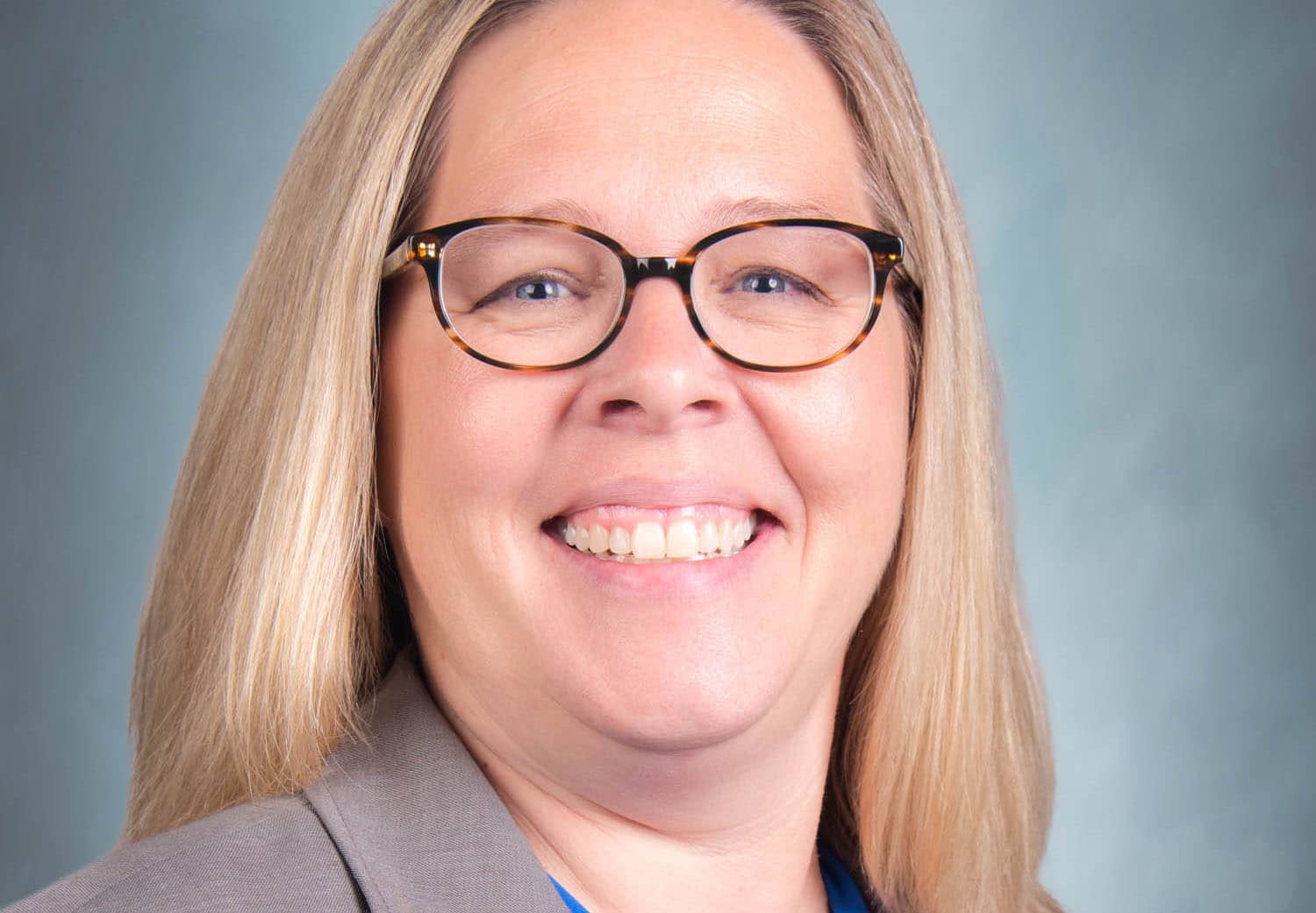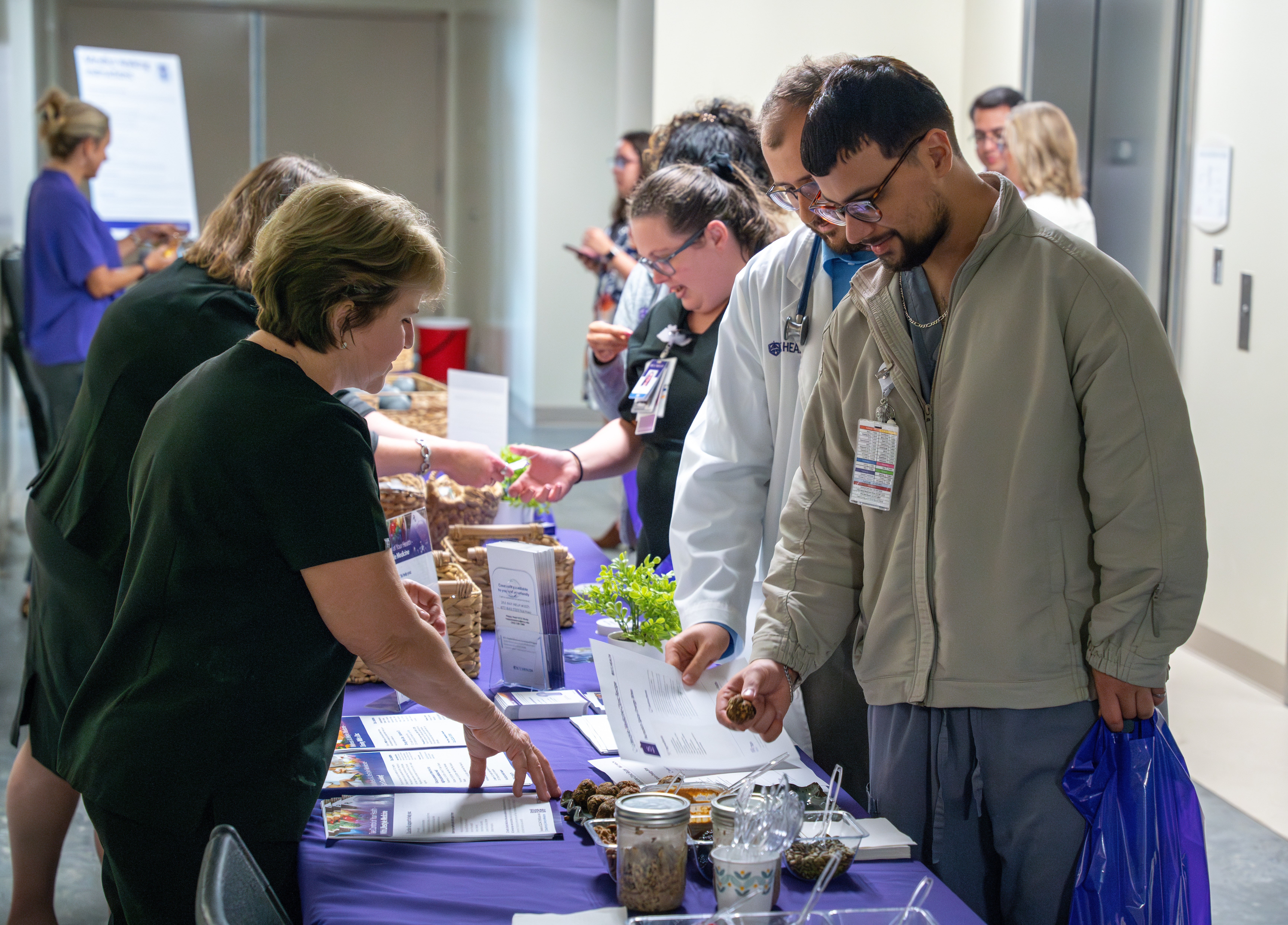Greenville, N.C. – ECU Health, eastern North Carolina’s leading academic health care system, has named Kelly Weatherly, MBA, CEBS, SPHR, as Chief Human Resources Officer (CHRO) effective immediately. As CHRO, Weatherly will direct human resources operations for the health system and its 14,000-plus team members. She will report directly to ECU Health Chief Operating Officer Brian Floyd.
“I’ve had the pleasure of working closely with Kelly and our HR leaders as we modernize how HR serves the enterprise,” said Floyd. “This has included a refinement of the strategy, processes and procedures that support ‘people development.’ I feel strongly that her leadership in the chief human resources officer role will help ECU Health in its mission of improving the health and well-being of eastern North Carolina. I look forward to continuing to work closely with Kelly and the entire HR team.”
Weatherly joined ECU Health in 2022 as the vice president of Total Rewards and HR Operations. Since then, she has successfully led the HR team through a strategic transformation which has advanced HR programs, technology and practices.
Through Weatherly’s leadership, the HR team revamped ECU Health’s performance management system, implemented improvements to benefits offerings based on organizational growth and team member feedback, developed a system-wide database to track recruitment and retention efforts and continued to grow our internship and talent management pipeline.
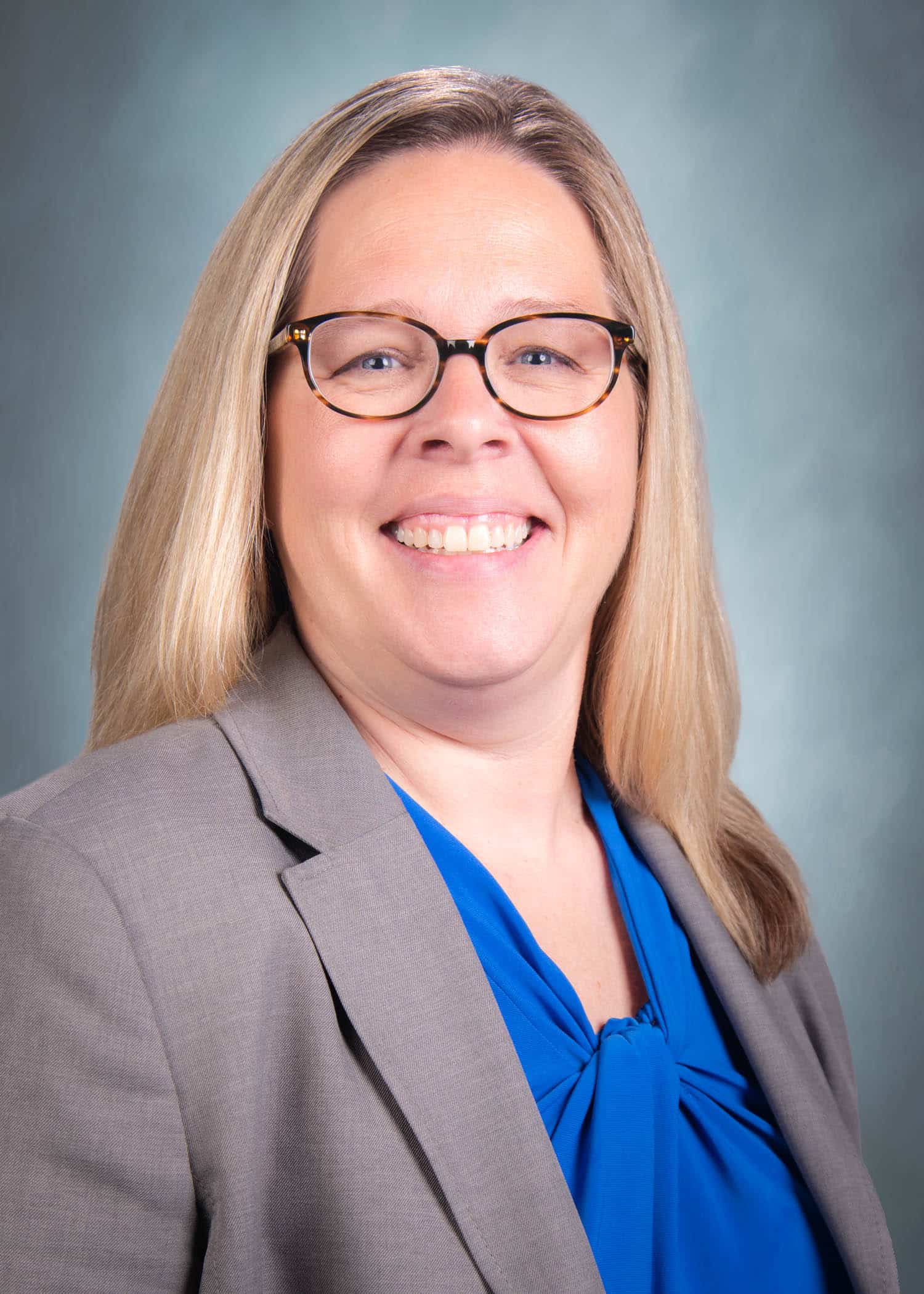
Healthy snacks, well-being resources, a mindful walking trail and more were all on display at ECU Health Medical Center’s new Resident Well-Being Zone as part of a recent pop-up event hosted by ECU Health’s Well-Being team.
Resident physicians from across the Medical Center were invited to the pop-up event as a way of showcasing the new space, intentionally designed to support their well-being as they continue in their journey in medical education.
The pop-up event, according to Dr. Christina Bowen, ECU Health’s chief well-being officer, is an important way of ensuring residents are aware of the resources available to them at ECU Health.
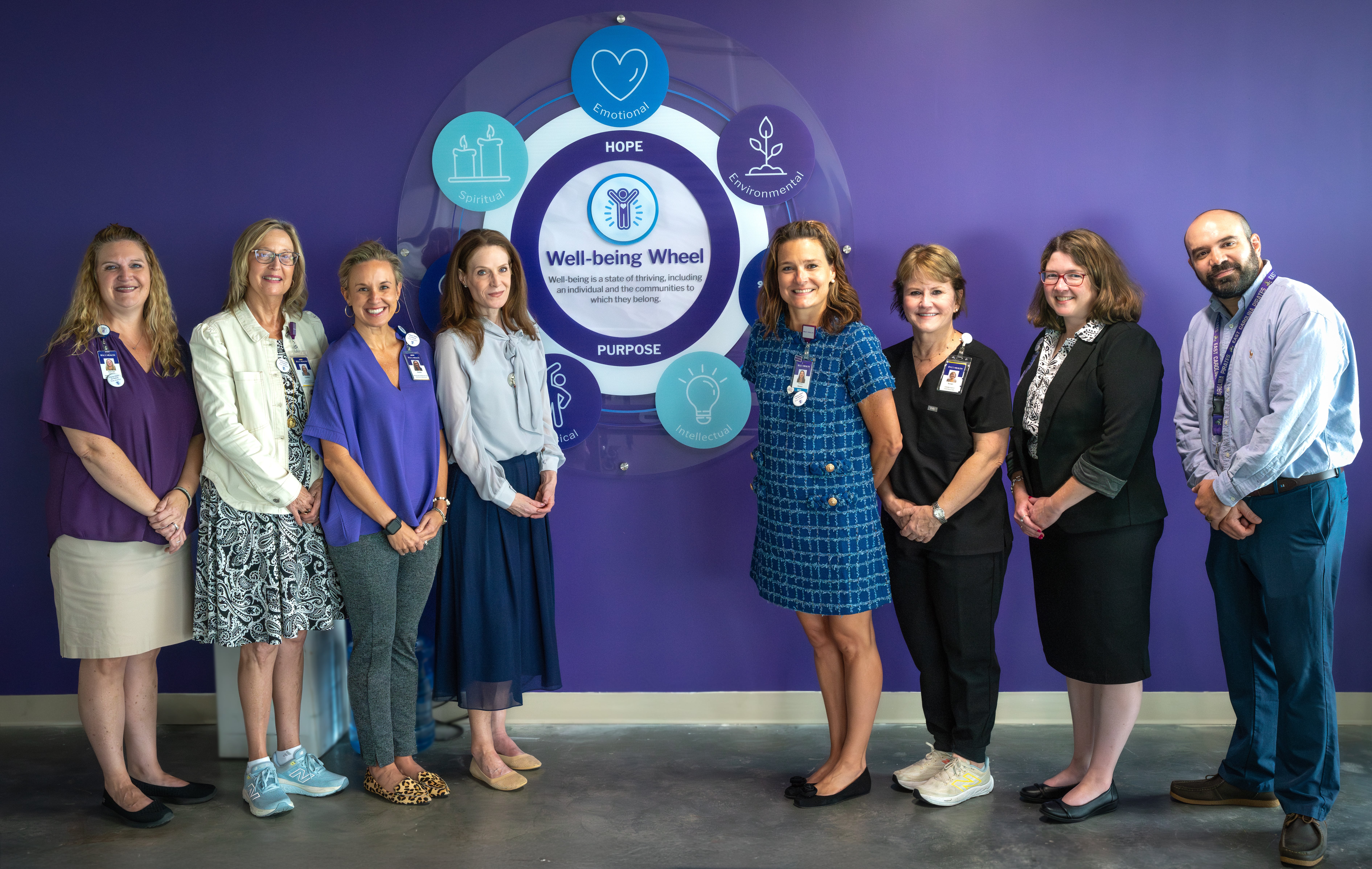
“We are thrilled to have a resident well-being zone and to be able to offer something unique and purposeful to our resident physicians, who play such an important role here at ECU Health Medical Center,” said Dr. Christina Bowen, Chief Well-being officer at ECU Health. “The pop-up events are a fun way to get our resident physicians engaged in well-being and mindfulness which we know will benefit them during their time here at ECU Health. Our team is excited to be able to host well-being events throughout the year.”
Located on the sixth floor of the Eddie and Jo Allison Smith Cancer Center at ECU Health Medical Center, the Resident Well-Being Zone officially opened in August after years of thoughtful design and funding provided by the ECU Health Foundation. The space is filled with all the essentials a resident may need: exercise equipment, charting space, healthy snacks, coffee, even a ping-pong table and more.
Dr. Cole Carter, a fourth-year physical medicine and rehabilitation resident, said the pop-up event and the space itself have proven to be a welcome asset in the resident experience at ECU Health.
“I think it’s great,” Dr. Carter said, noting that his favorite part of the space is the ping-pong table. “It’s a great place to check out when you need a break from the busy schedule. You can get a great view of Greenville and just take time to relax. I try to come up here once a month or so. This is a great asset for our residents and for those who may be looking for a residency program.”
Dr. Mary Catherine Turner, interim associate dean of Graduate Medical Education, understands first-hand the value of a Resident Well-Being Zone. She said she was fortunate to have one during her time as a resident physician, and it helped her take a break, refresh her mind and get re-engaged in the mission-driven work of providing high-quality health care. Now, she is excited that current and future resident physicians get to experience a similar benefit as they care for patients and continue to learn at one of the busiest academic medical centers in the nation.
“A space like this is important for residents,” Dr. Turner said. “Residents need a place where they can go and disconnect from their work for a little bit and reconnect with themselves. And importantly this is a place where residents can congregate together. I think there’s a lot that can be said for building a community, and this allows them the space to do that.”
On Aug. 28, East Carolina University College of Nursing and ECU Health gathered to celebrate their academic-practice partnership. Topics of discussion included entry-level and graduate-level education and practice, nursing research, and their vision for the future.
Chief Nursing Executive of ECU Health, Dr. Trish Baise, appreciates all the work that has been done by the collective nursing leadership team over the last few months. “We have built a strong foundation and are already realizing outcomes. This is just the beginning. Both our institutions are committed to finding innovative partnership opportunities that support the needs of our region and a better future for eastern North Carolina.” Baise said.
Dr. Bimbola F. Akintade, dean and professor at ECU College of Nursing, reflected on the past and mentioned that both institutions have come a long way.

“One of our advantages is not just the proximity but the overarching institutional dynamic we share can only serve as resources. Our vision is that both institutions are so intertwined that students who are graduating from ECU will also see an opportunity to work at ECU Health,” Akintade said.
Graduate-level education programs such as the Adult-Gerontology Clinical Nurse Specialist and the Neonatal Clinical Nurse Specialist concentrations are advancing nursing practice to provide better care for eastern North Carolina. The Clinical Nurse Specialist (CNS) program is unique and the only one in North Carolina. In addition to graduate-level programs, ECU and ECU Health have collaborated to sponsor a nurse extern program. This immersive program, allows students to gain practical experience in various care settings across the health system before their final semesters of nursing school.
During the celebration, a recent graduate of the nurse extern program expressed her gratitude. “I have never been more sure that I am where I’m supposed to be as a nurse and here at ECU Health,” she said. Kiley Fisher will be joining ECU Health Medical Center in February 2025.
Both institutions are hopeful for the future and what is to come.
Dr. James Speicher, a thoracic surgeon at ECU Health Medical Center and director of the Thoracic Surgery residency program, and his team are working to improve pain management in patients after their surgery.
After meeting with other thoracic surgeons outside of the ECU Health system and hearing a presentation on non-opioid pain management, Dr. Speicher knew it was something he wanted to bring to his thoracic surgery patients in eastern North Carolina.
“I said, ‘That’s a great idea.’ I came back from the meeting and said to the team, ‘Hey, let’s try to do this.’ It took us some time to get access to one of the medications we would use in the pain management protocol, but we started with our protocol multimodal pain management while avoiding narcotics in 2019.”
Dr. Speicher said the new pain management protocol includes a long-acting local anesthetic for nerve blocks, along with a muscle relaxer, nerve pain medication, acetaminophen and anti-inflammatories.
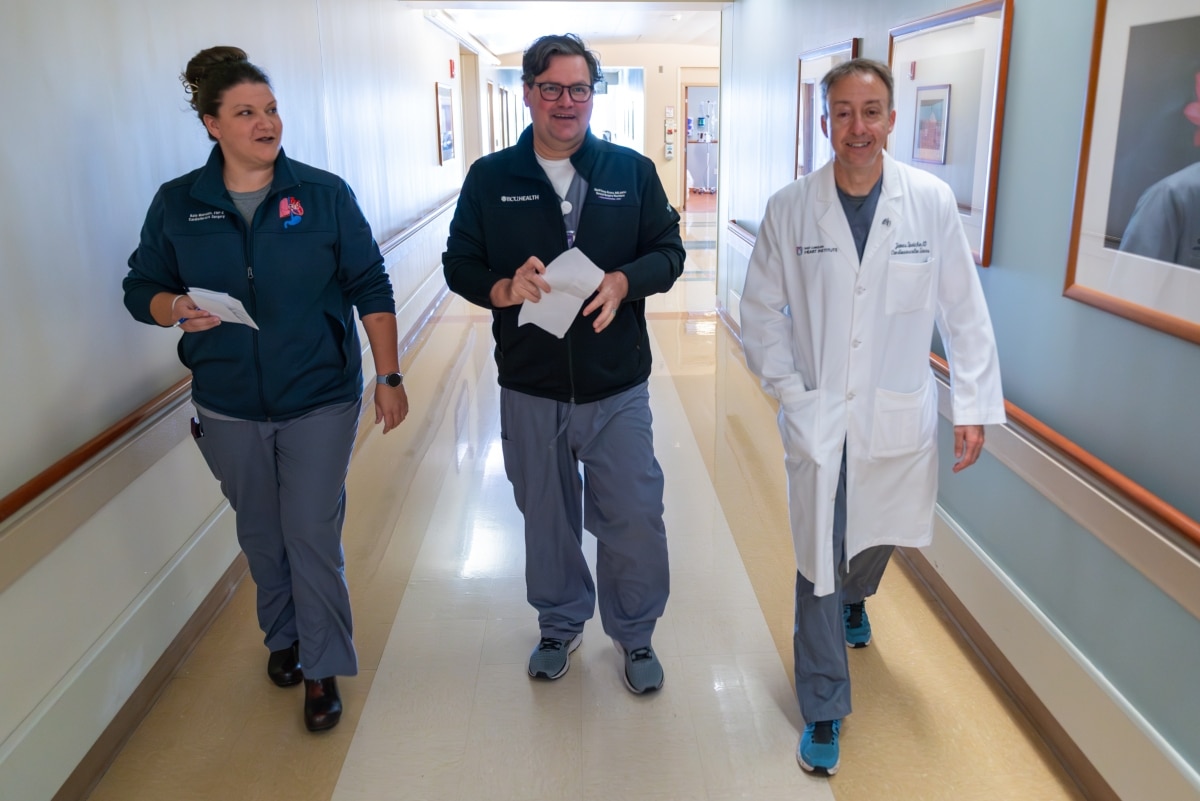
The goal of the program was to send fewer patients home with prescription narcotics while limiting the use of patient-controlled analgesia pumps for patients in the hospital after surgery.
As the team looked at surgical data from 2016-19 and compared it to the study, running from 2019 to today, he said the team found even better results than they were expecting.
“What we found with our study was we had really significant reductions in the uses of opioids. It was around an 85 to 90 percent reduction in our opioid use inpatient and around 60 percent of patients weren’t going home with any sort of narcotic prescriptions,” Dr. Speicher said. “The other thing that was really impressive to me in the study was that our average pain score was actually better for our patients on the non-narcotic protocol. We were reducing the use of narcotics on the floor, sending people home with less prescriptions and introducing fewer opioids into the community, all while actually doing a better job controlling their pain.”
The opioid-free pain management program is part of a larger enhanced recovery after surgery protocol, which Dr. Speicher and his team has been working on over the last few years. He said the team has put in place walking protocols and pre-operative carbohydrate loading along with other changes that have been shown to improve outcomes for patients.
This program is active for thoracic surgeries at ECU Health Medical Center.
“This is exciting work for us because we’re really focusing on helping make patients comfortable, controlling their pain post-surgery and getting them home more quickly,” Dr. Speicher said. “If we can do all of that without a narcotic prescription, that’s a really big win for the patients we serve and the community as a whole.”
When Dr. Tate Holbrook, a pediatric hematologist, founded the Comprehensive Sickle Cell Disease Program at East Carolina University in 1979, he was inspired by the need for basic health care services specifically designed to meet the unique needs of sickle cell patients.
Now, 45 years later, the program stands proudly as a leader in North Carolina at providing state-of-the-art medical care for those living with sickle cell disease, and its founder credits the annual Tate Holbrook Annual Sickle Cell Disease Update conference as a key component of that success.
“ECU has a reputation as being a hands-on, compassionate and people-centered organization,” said Dr. Holbrook, who the conference was named after following his retirement in 2022. “The care at ECU Health Medical Center is exceptional and it’s because of the people who really care. This conference is a big cooperative effort that brings like-minded people together such as researchers, pharmaceutical companies, and others who are helping create advancements in treatment for sickle cell patients.”

The Tate Holbrook Annual Sickle Cell Disease Update is hosted by East Carolina University’s Comprehensive Sickle Cell Program and the Department of Pediatrics Hematology/Oncology, in collaboration with Eastern AHEC. The goal of the conference is to bring together medical professionals and patients to bridge the gap of communication and to improve treatment for patients with sickle cell disease.
To meet this goal, professionals with knowledge and recognition in the sickle cell community discuss the latest advances in treatment of sickle cell disease, cutting edge research, established and new medications and therapies, as well as psychosocial interventions. Conference organizers aim to encourage further discussion between providers and patients to create an environment focused on patient needs.
The most recent conference was hosted at Eastern AHEC on Sept. 6 and brought together medical professionals with 25 patients and six community-based vendors together to learn in a collaborative environment and provide resources to those living with sickle cell disease.
“I’ve come to this conference every year since 2009 when I retired and moved down here,” said Stephanie King, 70, who lives with sickle cell disease. “I think people with the disease should come to these types of events because there’s so much to learn about sickle cell. I go places and I speak about my experience and I have young people that come up to me and say ‘Oh my gosh, you can live this long with sickle cell disease?’ and I always say ‘Yes!’ With medical enhancements and the resources available, we can make it to 70 and beyond.”
Patients like King are at the heart of the conference. The concept of collaborative comprehensive care helps provide state of the art medical care for patients, including education of families and health care providers, psychosocial support to patients, families and community groups, and access to new and innovative therapies. It also emphasizes a close working relationship with other agencies involved in the care of individuals with hemoglobinopathies, including medical centers, community-based sickle cell programs, and the NC Sickle Cell Syndrome Program.
The collaborative approach is what drives progress forward for those living with sickle cell disease, according to Dr. Beng Fuh, current program director of the Comprehensive Sickle Cell Disease Program at ECU.
“One of the most important parts of this conference is that it brings patients with sickle cell together with medical providers,” said Dr. Fuh. “We get to facilitate that exchange between patients and providers to learn how we can improve things and how we can get better. Sickle cell functions best when we take that collaborative approach. When we can hear from each other, we make our providers better and we improve understanding of the disease for patients. When we’re here together we gain a greater appreciation for the fact that we’re all on the same team.”
The Great 100 Nurses in North Carolina honors the nursing profession by recognizing nurses around the state for their commitment to excellence. The recipients are distinguished for their outstanding professional ability as well as their contributions to improving health care services in their communities. This year, 19 ECU Health nurses were recognized as honorees, including Kimberly Askew, Jessica Noble, Amber Oakes and Kathryn Jarvis.
Kimberly Askew
 Like so many aspiring nurses, Kimberly Askew decided to pursue nursing because of her mother. “It was my dream to be a labor and delivery nurse like my mother,” Kimberly said. “She went to nursing school and graduated when I was in eighth grade, and I saw what a difference it made for her and our family. She has served as a great inspiration for me in all aspects of my life.”
Like so many aspiring nurses, Kimberly Askew decided to pursue nursing because of her mother. “It was my dream to be a labor and delivery nurse like my mother,” Kimberly said. “She went to nursing school and graduated when I was in eighth grade, and I saw what a difference it made for her and our family. She has served as a great inspiration for me in all aspects of my life.”

Kimberly started working at ECU Health Roanoke Chowan Hospital 19 years ago as a certified nursing assistant, and through the Homegrown program, she attended Roanoke Chowan Community College to get her associate in nursing degree. In the ensuing years, she has served as a charge nurse, a preceptor, a childbirth educator, a unit educator and an ALSO instructor. She spent 12 years in labor and delivery, three in the medical/surgical unit and the last four years in the peri-operative unit.
To be recognized as a Great 100 Nurse is an honor, she said, one that acknowledges the work she does and the difference she makes. “It means a lot that others see what I’m doing. What we as ECU Health nurses do for our communities is so very important.” Yet, she also said it was a shock when she learned she’d won the award. “I could name at least a dozen others who deserve this recognition. We as humans always have self-doubt and I think everyone deserves to see how others see them.”
Jessica Noble
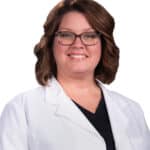 As a registered nurse with over 20 years of experience in maternal health, Jessica Noble currently serves as the perinatal nurse champion and navigator for ECU Health Medical Center. She received her BSN from East Caroline University and a master’s in nursing education from the University of North Carolina at Wilmington, and she is an active member in the Association of Women’s Health, Obstetric, and Neonatal Nurses and serves on the DHHS Maternal Health Task Force. These partnerships have, she said, “made eastern North Carolina and ECU Health the best place to have a baby.”
As a registered nurse with over 20 years of experience in maternal health, Jessica Noble currently serves as the perinatal nurse champion and navigator for ECU Health Medical Center. She received her BSN from East Caroline University and a master’s in nursing education from the University of North Carolina at Wilmington, and she is an active member in the Association of Women’s Health, Obstetric, and Neonatal Nurses and serves on the DHHS Maternal Health Task Force. These partnerships have, she said, “made eastern North Carolina and ECU Health the best place to have a baby.”
Her passion for nursing began when she was three years old. “My great-grandmother looked after me while my mother worked, and I vividly recall climbing to reach the kitchen cabinet to get her medicine,” Jessica said. “She cared for me when I was ill, and I cherished the opportunity to care for her in return.”
While she is proud to be recognized as a Great 100 Nurse, Jessica said the honor was due in part to knowing that the Great 100 recognizes exceptional nurses. “This recognition makes me feel accomplished and proud to be a part of such a distinguished group of nurses across North Carolina and from ECU Health. Having 19 nurses from ECU Health recognized reflects how much ECU Health values its team members and is committed to their success.”
Amber Oakes
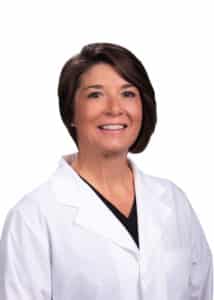 An eastern North Carolina native, Amber Oakes received her associate degree in nursing from Pitt Community College and her BSN from Western Carolina University. She’s worked at ECU Health Medical Center for 14 years, and most recently she specialized in gynecology/oncology in the outpatient clinic at ECU Health Cancer Center.
An eastern North Carolina native, Amber Oakes received her associate degree in nursing from Pitt Community College and her BSN from Western Carolina University. She’s worked at ECU Health Medical Center for 14 years, and most recently she specialized in gynecology/oncology in the outpatient clinic at ECU Health Cancer Center.
Her desire to support patients with cancer began with a friend. “My desire to support a best friend who was fighting for her life launched me into a natural path of caring for others,” she said. “Building relationships with the care team inspired me to care for others with empathy and compassion, and I’m forever grateful for all those nurses did for my friend.” Amber also mentioned what she called her “dynamic” view of nursing. “I see it through the lens of a patient who lives with Multiple Sclerosis; a caregiver to my mother who battled breast cancer and a professional who cares for the oncology patients in eastern North Carolina.”
Amber said she is honored to be named among the Great 100 Nurses: “The legacy of the Great 100 Nurses of NC is revered throughout ECU Health and highly coveted. It is a testament to our organization’s emphasis on continuing education, advanced training, quality improvement efforts and exceptional patient care.” Her strong work ethic and her team help her apply her knowledge, skills and experience with the success of their clinic.
Kathryn Jarvis
 Kathryn Jarvis, the senior director for Children’s Services at ECU Health Maynard Children’s Hospital, has been a nurse at ECU Health Medical Center for 12 years. She received both her BSN and MSN from ECU and her doctorate of nursing practice (DNP) with a concentration in nurse executive leadership from the University of North Carolina at Wilmington. Kathryn is also a part-time faculty member for ECU’s DNP program. Her hard work has been in an effort to improve the care for pediatric patients throughout eastern North Carolina. “I want every child who needs medical care at one of our facilities to receive best practice, compassionate, patient and family-centered care,” she said.
Kathryn Jarvis, the senior director for Children’s Services at ECU Health Maynard Children’s Hospital, has been a nurse at ECU Health Medical Center for 12 years. She received both her BSN and MSN from ECU and her doctorate of nursing practice (DNP) with a concentration in nurse executive leadership from the University of North Carolina at Wilmington. Kathryn is also a part-time faculty member for ECU’s DNP program. Her hard work has been in an effort to improve the care for pediatric patients throughout eastern North Carolina. “I want every child who needs medical care at one of our facilities to receive best practice, compassionate, patient and family-centered care,” she said.
For as long as she could remember, Kathryn wanted to be a nurse. “I used to want to be a teacher during the week and a nurse on the weekends, but I quickly changed my mind when I realized a person needed a few days off now and then,” she said. Now she has a true passion for pediatric nursing, where she can “care for some of the most resilient patients out there.”
Kathryn expressed deep appreciation for even being nominated as a Great 100 Nurse, let alone to be an honoree. “I don’t think I can adequately express what it means to be recognized as a Great 100 nurse. I have known a multitude of amazing nurses who have received this recognition, and it makes me proud to join them.”
The recipients will be honored at a statewide gala in September, to be held in Concord, North Carolina.
Insley Santifort was born in November of 2020 with no kidney function; from the beginning of her life, she had to be on dialysis. After an unsuccessful initial kidney transplant at another institution, Insley transferred to ECU Health to receive a second kidney transplant in 2024. With the help of her family, her kidney donors, her surgeons and the entire ECU Health transplant team, Insley is now able to do some things she and her family weren’t sure would ever be possible.
In need of a kidney
After Insley’s traumatic birth, wherein she suffered from hypoxic ischemic encephalopathy (HIE) and catastrophic blood loss to her kidneys, she was moved to Maynard Children’s Hospital to receive the best care possible. That’s where she and her family met Dr. Liliana Gomez Mendez, a pediatric nephrologist. “I met Insley shortly after she was born, which was a traumatic birth,” Dr. Gomez Mendez said. “She was transferred to ECU Health, and we knew her kidneys weren’t working, so she started dialysis the first week of her life. When she came to the NICU, no one knew what would happen.” Insley was able to leave the NICU after 55 days, but her status was still tenuous. Dr. Gomez Mendez decided to refer Insley to the organ transplant team.
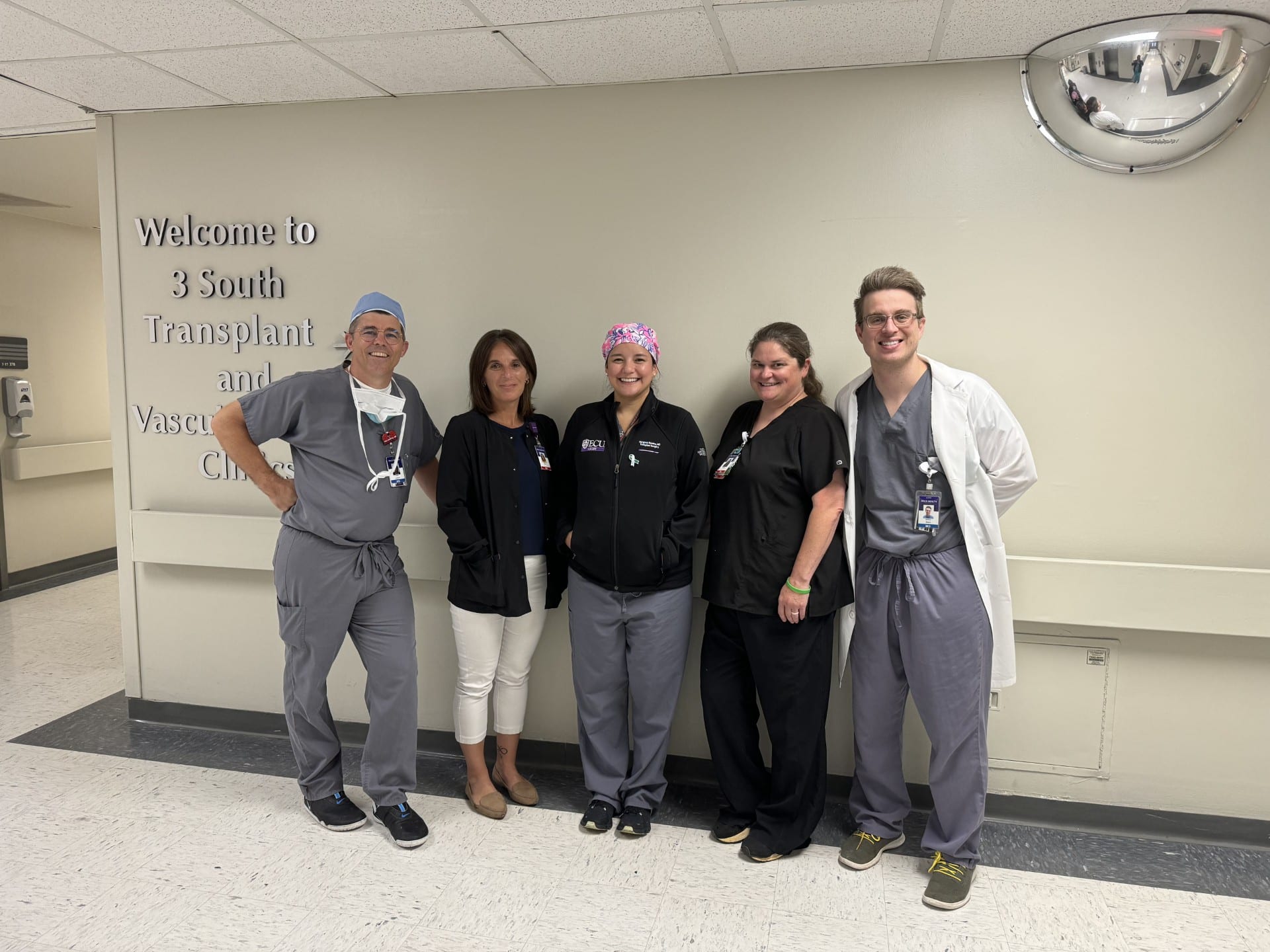
That team included Dr. David Leeser, the chief of Kidney and Pancreas Transplantation, and Dr. Margaret Romine, who specializes in transplant surgery and serves as the director of the Living Donor Program. “We worked her up and planned for a living donor,” Dr. Leeser said, “But because of reasons beyond their control, the family had to go to another North Carolina transplant center.” Insley’s family put out a call to their friends and family to secure a kidney for their daughter when Insley’s immediate family members weren’t a match. “I was of course tested but was denied based on some findings,” Kayla Santifort, Insley’s mom, said. “My husband wasn’t a match because of blood type, so at that point we had to turn to our community for help.”
Incredibly, they were able to find a donor, and Insley had her first kidney transplant in July 2023. The transplant, however, was not successful. “Her transplant thrombosed within the first 48 hours of surgery,” Dr. Leeser explained. “There are of course risks for this type of surgery,” Dr. Gomez Mendez added. “And so Insley ended up in critical condition.” Insley pulled through, and the kidney regained some function, but it became clear that she was going to need another kidney, and soon. “That’s when Insley’s family came back to ECU Health,” Dr. Gomez Mendez said. “Before we were even discharged from the other hospital, I reached out to Dr. Gomez Mendez and told her we wanted to transfer back to ECU Health,” Kayla said. “Because Insley was a fresh transplant and the kidney was technically working enough to keep her off dialysis, Dr. Gomez Mendez had to get the okay from Dr. Leeser and his team to accept us back.” Dr. Leeser said they would take Insley’s case, although it was anything but uncomplicated. “Insley’s case was not standard, and I think that her case is a true testament to the potential of our program,” Dr. Romine said.
Kayla and Insley’s family found themselves in the same predicament as before: they needed a new kidney and a new donor. “How do you ask someone to put their life on hold and take a part of themselves to give to your daughter to save her life?” Kayla said. Yet, Insley’s family and the transplant team were amazed when more than 100 people came forward to be tested as potential donors. “That’s the most the transplant team ever had,” Kayla said. “We had people from Wayne County, Duplin County and even out of state get tested. It shows how close our communities are.” There were so many volunteers, it took some time to parse through the list. “It’s a huge process of evaluating potential donors, and we were fortunate to have a good donor from that list,” said Dr. Romine.
A new donor
That donor was Jenny Godwin, a former ECU Health team member who worked in the transplant operating room (OR). She also happened to know Kayla from when they worked together at UNC Health Wayne in the emergency department (ED). “We’ve known each other for years,” Kayla said. “Did I think 10 years ago Jenny would be the one to donate her kidney to save my daughter’s life? No. Now I couldn’t imagine life without her and her family.”
When Jenny learned Insley needed a second kidney, something told her to get tested. Kayla, too, had a similar premonition. “I knew they were looking for a small female donor, and I just had this feeling about Jenny,” Kayla said. “I remember I was sitting in my truck when Jenny FaceTimed me to tell me she was a match. There are days now that I cry to know someone like Jenny with kids and a husband was willing to save my child’s life.” Jenny said her experience in the transplant OR helped her feel at peace about the decision to donate. “When I was on the transplant team, I assisted with living donors and witnessed transplants in the OR. After I found out I was a match, I met with the transplant team to discuss my surgery and it was amazing. It felt right.”
“You’d be surprised at how many people decide to donate a kidney,” Dr. Leeser said of Jenny’s generosity. “It takes folks who are committed to making an impact on the world and the greater good in a way that is utterly selfless and remarkable.” Dr. Leeser noted that although it’s very safe to be a living donor, more than 100,000 people are on a waitlist for a new kidney. “If only .03% of the U.S. population donated a kidney, we would wipe out that waitlist in a year,” he said.

The team scheduled Insley’s surgery for several months out, in the hopes that she would heal from her first transplant while avoiding putting her back on dialysis. Finally, in February 2024, Jenny donated her kidney and Insley underwent her second kidney transplant in less than a year. Dr. Matthew Black, the newest partner on the transplant team, worked with Dr. Leeser to prepare Insley for the implant. “The surgery was complex enough to require two attending level surgeons,” Dr. Leeser said. Dr. Leeser acknowledged that it was a challenging surgery, and not just because Insley was a small child. “There was scar tissue, and of course we had to remove the first kidney to put in the new one,” he said. “In a child that size, you worry about blood loss. Everything in a child is fragile, but everything went exceedingly well.” Dr. Gomez Mendez was also pleased with the surgery outcomes: “The kidney began working immediately, and she had no complications.”
A team like no other
Kayla attributes her daughter’s successful outcomes to the transplant team, Dr. Gomez Mendez, the pediatric intensive care unit (PICU) and Insley’s entire ECU Health team. “They are all just phenomenal,” she said. “They were very up front and honest that this was going to be a difficult and lengthy surgery, but after hearing their plans, I knew we were in the best hands. If anyone could explant and transplant her, it was this team.” Jenny felt the same way: “Not all teams get along and you can feel that. This one makes you feel like it’s a family and they’re on the same page, and that shows. The morning of my surgery I felt at ease and peace.”
Dr. Leeser also had a lot to say about the knowledge, skill and teamwork of the ECU Health transplant team: “Dr. Romine runs the donor side of things, and she’s helped to grow our program over the last six to seven years, so we’ve gone from doing around 80 surgeries a year to between 130 and 160 a year. And Dr. Gomez Mendez came to us from the University of California San Francisco, one of the best hospital systems in the world for transplants. She’s exceedingly intelligent and understands the psyche of surgeons. She is as big of a reason Insley’s family wanted to be at ECU Health as anyone else.”
Together, Dr. Leeser said this team is always focused on taking care of the patients and will work through any issues. “You want physicians who push and test each other. Our team has great discussions. Sometimes we laugh, sometimes things are tense, but at the end of the day, we’re all in it together.” That involves everyone, he said, including administrators, surgical coordinators, social workers, nutritionists, nurses, pharmacists and countless others. “This work takes a tremendous amount of support. In the intensive care unit (ICU) we meet with nurses and managers on a regular basis, and we’ve developed strong relationships with our PICU colleagues. We have learned how to work together to bring the most of what each of us can to the patients.”
Dr. Romine agreed, citing the unique nature of their team. “We’re doing what bigger systems are doing with less resources. That’s only possible with a team that buys into the goal,” she said. These services are especially important, as they provide vital services to a region in need. “One of the things I’m proud of is that there’s such a need medically and a lot of patients who otherwise would have to go to elsewhere don’t have to. I love that our program is allowing access to care that wouldn’t otherwise be there.”
The result of this teamwork is positive patient outcomes, including those for Insley. “She went home after five days in the hospital and she’s done superbly well,” Dr. Leeser said. “When you have renal failure, you don’t feel well and things don’t taste good, so Insley wasn’t eating much before the surgery. Insley is now able to enjoy some foods.” Kayla also sees the change in Insley’s quality of life. “If you look at Insley and know her story, you know how much she and our family have suffered. She couldn’t go swimming or go to the beach, or even take an actual bath when she was on dialysis. We’re going to the beach this weekend to celebrate Jenny and her family.” It’s those little things Kayla said people take for granted but are so special now.
A gift that saves lives
Those little things wouldn’t be possible without generous donors like Jenny, as well as Insley’s first kidney donor, and the National Kidney Registry. “I want to raise awareness about organ donation, and not just after someone passes away,” Kayla said. “Living donation allows you to give a part of yourself while you’re still alive to save someone else. As a nurse and the mom of a transplant patient, the importance of organ donation has never been more real.” Jenny, too, was eager to speak about her experience so others can consider doing what she did. “If anyone is on the fence, I am happy to talk with them. It’s important we have living donors.” Dr. Leeser emphasized that the National Kidney Registry is a great place for potential donors to explore their options. “Someone might want to donate to their family member, so we put the donor in the registry. Even if they don’t match with their intended person, they can still donate their kidney to someone who needs it, and their intended recipient receives a voucher so they receive a kidney from a well-matched donor on the registry.” Dr. Gomez Mendez also wanted people to know that kidneys donated from living donors perform better than those from deceased donors. “The only way for Insley to have the best outcomes was from a live donor,” she said. “A live kidney will last more than a deceased donation.” The National Kidney Registry’s website reports that the average length of time a kidney from a deceased donor lasts is 10-15 years, while it’s closer to 20-40 years when it’s from a living donor.
Because of Jenny’s gift of a kidney, and because of the hard work of Dr. Leeser, Dr. Romine, Dr. Gomez Mendez and the many others on the transplant team, Insley now has a chance at a normal life. “I’m so happy we are at a point where Insley has a fully functioning kidney. It was a long battle, and I’m happy to see her thriving and being a little kid,” said Dr. Gomez Mendez. Kayla attributes Insley’s success to the care she received from ECU Health. “I’d recommend ECU Health and the children’s hospital to anyone,” she said. “To watch her go from an unhealthy quality of life to growing and thriving – that reward is more than anyone could ask for.” Dr. Leeser is quick to share the credit for Insley’s and other patients’ success with the program and team, which they’ve worked to build over the last seven years. “I’m very proud of the program,” he said. “I would argue we’re the best program for kidney transplant in the state, and we’re on the precipice of doing even more.”
If you are interested in learning more about how to donate a kidney, you may visit https://www.kidneyregistry.org/, or if you’d like to learn more about ECU Health’s transplant services, visit here.
The Dr. Irons HealthAssist Clinic at JOY Community Center officially opened its doors on Tuesday, Sept. 10, following a ribbon-cutting ceremony led by Dr. Thomas Irons.
The clinic will provide free non-emergent health care and disease management services to uninsured individuals in the community.
Dr. Irons, a lifelong advocate for community health, served as the chief medical officer for Access East, a nonprofit ECU Health affiliate. He recently retired from his distinguished career as a professor at East Carolina University’s Brody School of Medicine, where he was also a pediatric physician. In recognition of his decades of service, Dr. Irons was awarded the Order of the Longleaf Pine, North Carolina’s highest civilian honor.
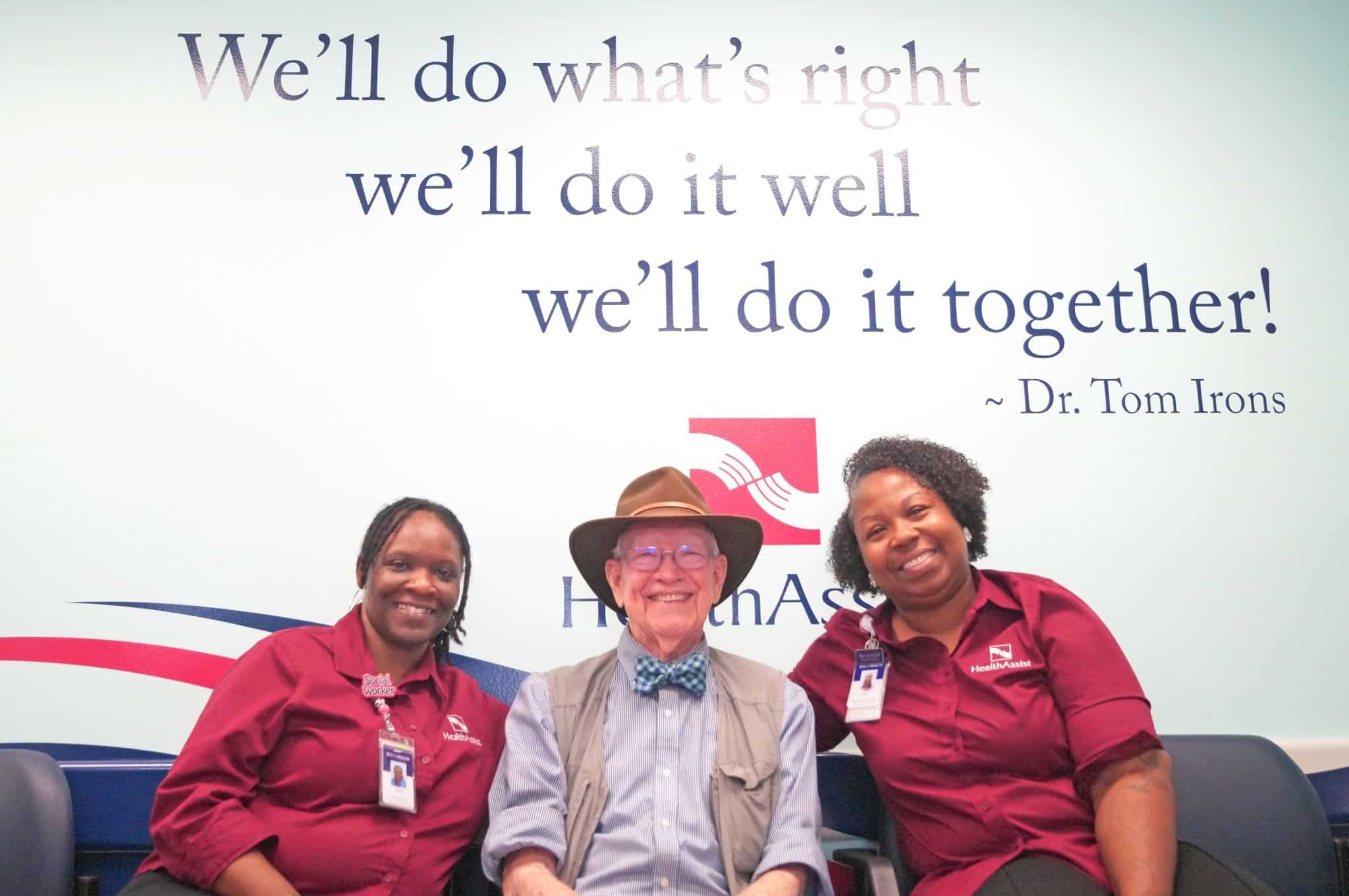
The clinic, also known as the Pitt County Care Clinic at JOY, is housed within the same building as the JOY Soup Kitchen and has been serving patients in various capacities for over a year. It provides comprehensive wraparound health services, including medication assistance, patient education and connections to local resources. The clinic also hosts regular outreach events with community partners such as PiCASO (Pitt County AIDS Service Organization) and the Food Bank of Central & Eastern North Carolina.
Equipped with two standard exam rooms, the clinic will offer free care for non-emergency conditions like colds, bug bites and rashes, as well as manage chronic illnesses such as heart disease, diabetes, high blood pressure and high cholesterol. In-house lab testing for A1C blood-sugar levels and cholesterol will be available, along with COVID-19 testing kits.
Uninsured patients from Pitt and surrounding counties, including Beaufort, Greene, Edgecombe, Hertford, and Martin, will also have the opportunity to join the Access East HealthAssist program, which helps coordinate more comprehensive health care at no cost.
The clinic is open weekdays from 10 a.m. to 2 p.m., with a nurse practitioner available on Wednesdays. Dr. Irons will mentor the clinic’s new nurse practitioner, a recent Duke University graduate. The JOY Community Center & Soup Kitchen is located at 700 Albemarle Ave. in Greenville.
The Great 100 Nurses in North Carolina honors the nursing profession by recognizing nurses around the state for their commitment to excellence. The recipients are distinguished for their outstanding professional ability as well as their contributions to improving health care services in their communities. This year, 19 ECU Health nurses were recognized as honorees, including Virginia “Ginny” Tripp, Rebecca Hagee, Jennifer Lewis, Kelly Trout and Kelly Elliott.
Virginia “Ginny” Tripp
Like many health care providers, Ginny Tripp, a professional development specialist in the Center for Learning and Performance at ECU Health Medical Center, found the inspiration to pursue nursing through her family. “My mother was a nurse, and she has always inspired me to be compassionate and care for everyone,” Ginny said. Her grandmother, also, was a huge support for Ginny and often prepared meals and helped take care of Ginny’s children while Ginny studied in school.

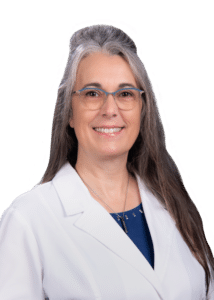 Ginny completed her associate degree in nursing in 1994 from Craven Community College and her BSN, which she received from East Carolina University, in 2006. She began her career at what was then Pitt County Memorial Hospital before transferring to a clinical practice closer to home. She always dreamed of returning “home” to ECU Health, however, and she did just that in 2009.
Ginny completed her associate degree in nursing in 1994 from Craven Community College and her BSN, which she received from East Carolina University, in 2006. She began her career at what was then Pitt County Memorial Hospital before transferring to a clinical practice closer to home. She always dreamed of returning “home” to ECU Health, however, and she did just that in 2009.
Now, Ginny’s mother can celebrate with her as she is honored as a Great 100 Nurse. “My mother cried for joy, and I was so excited to tell my family and leadership I received this recognition in my 30th year of service,” she said. Ginny said she was honored for her colleagues to recognize her service by nominating her for this award. “No matter what the need is, I try to find a way to support others and help them become the best version of themselves. I enjoy collaborating with an excellent team who strives to support each other.” Ginny was also quick to thank her leadership for supporting her along the way. “I am thankful to leadership who have helped me grow in my current role over the past nine years,” she said.
Ginny highlighted that having 19 Great 100 Nurse honorees was a nod to the support ECU Health provides its nurses every day. “I can only imagine that ECU Health is proud to know they have supported the professional growth and development of all the nurses who received nominations. For the 19 being honored, I am thankful I am a part of this elite group. We are living the mission and vision of ECU Health each day, and I feel blessed by God to be a part of something so much larger than myself.”
Rebecca Hagee
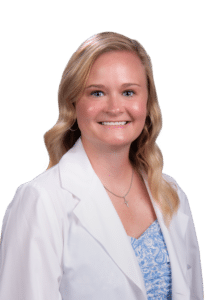 Rebecca Hagee, a staff nurse III in the surgical oncology clinic at ECU Health Cancer Center, began her career at ECU Health six years ago after graduating from Pitt Community College with her associate degree in nursing. She recently obtained her BSN from the University of North Carolina at Wilmington in 2023.
Rebecca Hagee, a staff nurse III in the surgical oncology clinic at ECU Health Cancer Center, began her career at ECU Health six years ago after graduating from Pitt Community College with her associate degree in nursing. She recently obtained her BSN from the University of North Carolina at Wilmington in 2023.
While Rebecca always knew she wanted to be a nurse, she initially thought she wanted to work in pediatric oncology. “I saw the movie Patch Adams at a young age, and I had my heart set on pediatric oncology,” she said. “Then I started my career on a general surgical unit, but I knew I wanted to work in oncology. When my current role became available, it was a perfect combination of my two interests.” Whatever her role, Rebecca said her goal in life is to “make an impact, and nursing gives me the opportunity to do that every day.”
When she learned she was a Great 100 Nurse, Rebecca said it was a surprise. “I still consider myself a ‘new’ nurse,” she explained. “I never in all my life expected to be presented with such an honor, and I’m so thankful for this opportunity to be recognized for everything I have poured into my nursing career.”
While she acknowledged that she strives to be there for patients during the hardest times of their lives, Rebecca also credited ECU Health’s support in being an honoree. “I would never have had this opportunity without ECU Health’s leadership. It has presented me with two of the best managers and assistant managers who encourage and push their team members to be the best they can be.”
Jennifer Lewis
 Jennifer Lewis, the outreach coordinator for ECU Health Medical Center Cancer Care, has worked for ECU Health for 32 years, 27 of them as a nurse. Jennifer got started at ECU Health Beaufort Hospital at the age of 18 as an emergency department (ED) clerk. “As long as I can remember, I wanted to be a nurse. I’ve always been impressed with nurses; they’re intelligent, kind and relatable. I worked in the ED to see what the healthcare setting was like,” she said.
Jennifer Lewis, the outreach coordinator for ECU Health Medical Center Cancer Care, has worked for ECU Health for 32 years, 27 of them as a nurse. Jennifer got started at ECU Health Beaufort Hospital at the age of 18 as an emergency department (ED) clerk. “As long as I can remember, I wanted to be a nurse. I’ve always been impressed with nurses; they’re intelligent, kind and relatable. I worked in the ED to see what the healthcare setting was like,” she said.
Jennifer liked what she saw, and she completed her associate degree in nursing from Beaufort County Community College before returning to ECU Health Beaufort Hospital, now as a nurse. “I was born at that hospital and had all three of my daughters there. It was home,” Jennifer said.
After getting her BSN from the University of North Carolina in Wilmington, which she was able to do through ECU Health’s tuition reimbursement program, she found a position at the ECU Health Medical Center and made the move to Greenville. “Life takes you down roads you don’t expect, but I love it,” she said.
Jennifer was shocked to learn she was a Great 100 Nurse honoree. “I’m pretty new at the Medical Center, so to know I’d been nominated by my peers was above anything I imagined,” she said. “It’s the ultimate compliment, and I’m humbled to be among the 19 who represent ECU Health.” Without the support of her team and ECU Health, Jennifer said she wouldn’t be who she is today. “I’m thankful ECU Health,” she said. “I appreciate working somewhere where they recognize nurses for their achievements and support and grow nurses. Becoming a nurse was by far one of the best decisions of my life, and I can’t imagine doing anything else.”
Kelly Trout
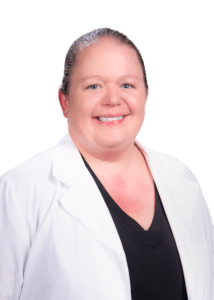 A staff nurse III in the medical oncology unit at ECU Health Medical Center, Kelly Trout has been a nurse, and has worked at ECU Health, for 15 years. “I got my bachelor’s in biology and psychology, but in 2007 I went back to school at Pitt Community College and got my nursing degree,” Kelly said. The inspiration to be a nurse came from her mother, who was a neonatal intensive care unit (NICU) nurse for 45 years. “I thought I wanted to be a doctor, but I enjoy direct care and hands-on patient interaction,” she said. A clinical rotation in medical oncology, as well as her family history of cancer, strengthened her decision to work in medical oncology. “It’s something I’m passionate about and it’s where I need to be.”
A staff nurse III in the medical oncology unit at ECU Health Medical Center, Kelly Trout has been a nurse, and has worked at ECU Health, for 15 years. “I got my bachelor’s in biology and psychology, but in 2007 I went back to school at Pitt Community College and got my nursing degree,” Kelly said. The inspiration to be a nurse came from her mother, who was a neonatal intensive care unit (NICU) nurse for 45 years. “I thought I wanted to be a doctor, but I enjoy direct care and hands-on patient interaction,” she said. A clinical rotation in medical oncology, as well as her family history of cancer, strengthened her decision to work in medical oncology. “It’s something I’m passionate about and it’s where I need to be.”
“I was shocked,” Kelly said of learning she was a Great 100 Nurse honoree. “These Great 100 nurses are doing something special, and I wondered – am I really one of those nurses? It’s a total honor.”
One of the biggest projects Kelly said she’s proud of starting in her unit is Santa’s Hope (previously Santa’s Workshop), where staff donate gifts for kids and adults and patients with cancer can then “shop” for their friends and family without compromising their immune system by going out in crowds. “We’ve had some wonderful stories. Little things like that make a difference, and I’m honored to be a part of this program.”
That ECU Health has 19 nurses on the Great 100 list is pretty special, she said. “It shows there are nurses who have their whole hearts invested in this and is representative of the care ECU Health provides,” she said. “It’s a wonderful way to advertise the care we provide and put our name out across the state.”
Katie Elliott
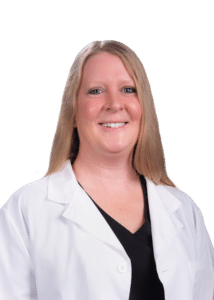 Katie Elliott is a staff nurse IV in the radiation oncology clinic at ECU Health Medical Center, where she’s worked for nearly 15 years. She originally obtained her associate degree in nursing at Beaufort Community College and started her career at ECU Health the same year on the traumatic brain injury inpatient rehabilitation unit. In 2019, she transitioned to radiation oncology, and in May, she received her BSN from Fayetteville State University.
Katie Elliott is a staff nurse IV in the radiation oncology clinic at ECU Health Medical Center, where she’s worked for nearly 15 years. She originally obtained her associate degree in nursing at Beaufort Community College and started her career at ECU Health the same year on the traumatic brain injury inpatient rehabilitation unit. In 2019, she transitioned to radiation oncology, and in May, she received her BSN from Fayetteville State University.
Katie knew from an early age she enjoyed helping people; however, a high school allied health class solidified her decision to become a nurse. Still, she was surprised to find out she was a Great 100 Nurse honoree. “I was so excited, I awakened my husband early in the morning, when I read the letter,” she laughed. “It’s an honor to know your teammates care enough to nominate you for such an amazing award.”
That nomination is the result of a dedication to her team and her patients. “I work hard, and my team sees how much I care,” Katie said. “Not just for my patients. I want to be sure our team is okay too. We take better care of our community by taking care of each other. I don’t just go to work, do my job, and go home. I want to be involved.”
That attitude is one that Katie sees reflected across the ECU Health system. “We go above and beyond in the care we provide for our patients and our communities,” she said. “I recommend ECU Health to anyone. Family members and myself have been patients here. It is comforting to know there’s a place close to home, delivering safe and compassionate care.”
The recipients will be honored at a statewide gala in September, to be held in Concord, North Carolina.
Greenville, N.C. – The American Psychiatric Association recently awarded East Carolina University (ECU) and ECU Health’s N.C. Statewide Telepsychiatry Program (NC-STeP) the prestigious Psychiatric Services Achievement Bronze Award for its significant contributions to the mental health field. NC-STeP, a virtual care-based program focused on enhancing access to mental health services in underserved parts of the state, was created in 2013 and is effectively reducing patient lengths of stay in emergency departments, increasing efficiency and improving costs by reducing the number of involuntary commitments, eliminating unnecessary admissions and improving patient transition to aftercare to reduce repeated visits.
“We are incredibly proud and honored to receive the Psychiatric Services Achievement Bronze Award from the American Psychiatric Association,” said Dr. Sy Saeed, director of the ECU Center for Telepsychiatry and founding executive director of NC-STeP.
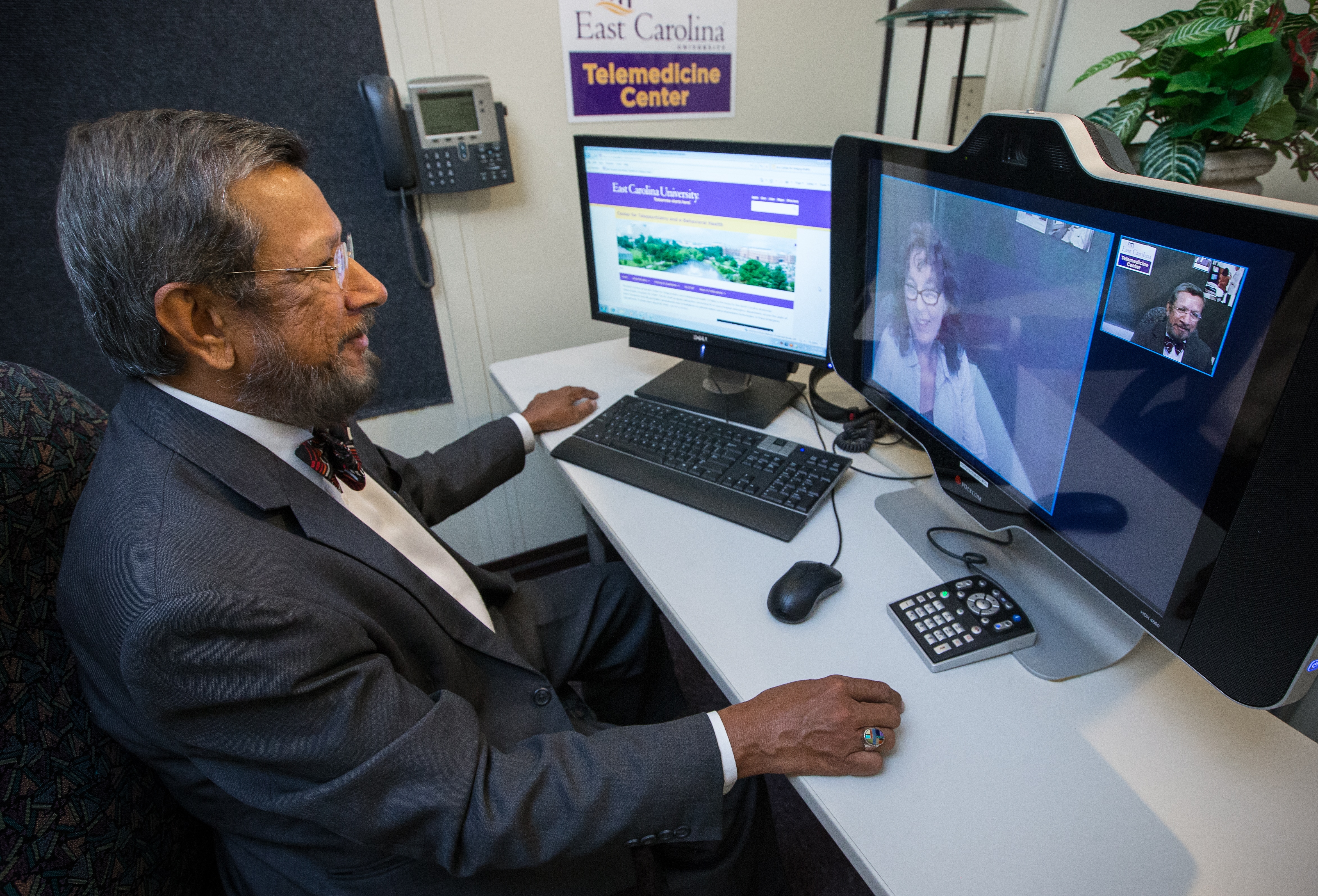
“This recognition highlights the unique strength of ECU and ECU Health working together to advance academic medicine and research to improve the health and well-being of eastern North Carolina. Through the innovative model developed by NC-STeP, we have leveraged our combined expertise to significantly improve mental health care across North Carolina, demonstrating how our collaborative efforts can lead to meaningful, statewide impact.”
NC-STeP provides telepsychiatry services in hospital emergency departments, as well as in the community-based medical clinics, to individuals in need of a psychiatric assessment. The vision of NC-STeP is to assure that individuals who present to any of its clinical sites, anywhere in the state of North Carolina, experiencing an acute behavioral health crisis will receive timely, evidence-based psychiatric consultation for diagnosis and treatment recommendations.
The American Psychiatric Association has recognized innovative programs serving individuals with mental illness or disabilities through the Psychiatric Services Achievement Awards since 1949. This award honors exceptional programs that offer innovative services, emphasize quality improvement, effectively utilize psychiatrists, peer support specialists, and other staff and actively involve consumers and their families.
NC-STeP is now an established model that is known nationally and internationally for its work with underserved communities. Dr. Saeed and members of the NC-STeP team have lectured and presented on this innovative model nationwide and internationally, including being an invited speaker at a White House Convening on telehealth in 2016. Hosted by ECU’s Center for Telepsychiatry, NC-STeP has conducted over 91,000 psychiatric assessments, at its 58 clinical sites across the state and has saved North Carolina more than $59 million by avoiding unneeded hospitalizations alone. Approximately one-third of the patients served had no insurance, with around 46% covered by Medicaid and Medicare.
In 2023, ECU received a $3.2 million grant from the United Health Foundation to provide mental health services for youth. Dr. Saeed, the principal investigator on the grant, established NC-STeP-Peds as part of the grant to provide mental health care services to children and adolescents in rural and underserved parts of the state. Six pediatric primary care clinics across the state have a space within the clinic where patients meet virtually with a licensed clinical social worker (LCSW) for therapy sessions. Patients referred for psychiatric care will also meet virtually with the child psychiatrist in the same space.
“NC-STeP is the perfect example of how the partnership between ECU and ECU Health is at the forefront of driving innovation in transformative behavioral health care in eastern North Carolina and beyond,” said Dr. Michael Waldrum, CEO of ECU Health and dean of the Brody School of Medicine at ECU. “NC-STeP leverages local academic and clinical expertise to address the most urgent challenges in rural health, especially in behavioral health. Together, we are not just meeting the needs of rural communities; we are pioneering new approaches that will reshape health outcomes across North Carolina. The American Psychiatric Association’s recognition of NC-STeP underscores our commitment to delivering cutting-edge solutions that ensure all North Carolinians have access to the care they need, right here in our state.”
